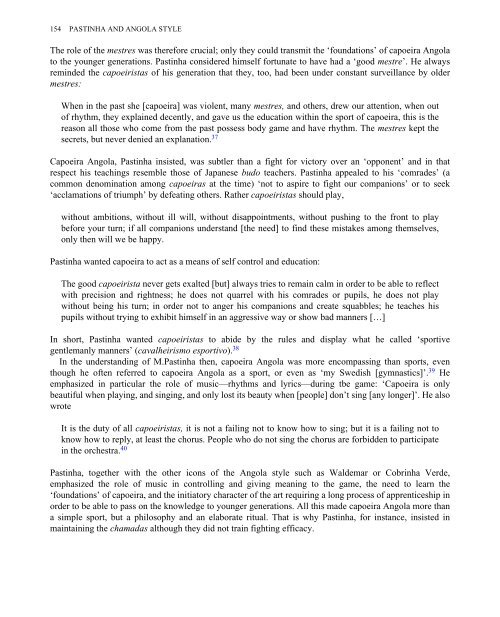Capoeira: The History of an Afro-Brazilian Martial Art
Capoeira: The History of an Afro-Brazilian Martial Art
Capoeira: The History of an Afro-Brazilian Martial Art
Create successful ePaper yourself
Turn your PDF publications into a flip-book with our unique Google optimized e-Paper software.
154 PASTINHA AND ANGOLA STYLE<br />
<strong>The</strong> role <strong>of</strong> the mestres was therefore crucial; only they could tr<strong>an</strong>smit the ‘foundations’ <strong>of</strong> capoeira Angola<br />
to the younger generations. Pastinha considered himself fortunate to have had a ‘good mestre’. He always<br />
reminded the capoeiristas <strong>of</strong> his generation that they, too, had been under const<strong>an</strong>t surveill<strong>an</strong>ce by older<br />
mestres:<br />
When in the past she [capoeira] was violent, m<strong>an</strong>y mestres, <strong>an</strong>d others, drew our attention, when out<br />
<strong>of</strong> rhythm, they explained decently, <strong>an</strong>d gave us the education within the sport <strong>of</strong> capoeira, this is the<br />
reason all those who come from the past possess body game <strong>an</strong>d have rhythm. <strong>The</strong> mestres kept the<br />
secrets, but never denied <strong>an</strong> expl<strong>an</strong>ation. 37<br />
<strong>Capoeira</strong> Angola, Pastinha insisted, was subtler th<strong>an</strong> a fight for victory over <strong>an</strong> ‘opponent’ <strong>an</strong>d in that<br />
respect his teachings resemble those <strong>of</strong> Jap<strong>an</strong>ese budo teachers. Pastinha appealed to his ‘comrades’ (a<br />
common denomination among capoeiras at the time) ‘not to aspire to fight our comp<strong>an</strong>ions’ or to seek<br />
‘acclamations <strong>of</strong> triumph’ by defeating others. Rather capoeiristas should play,<br />
without ambitions, without ill will, without disappointments, without pushing to the front to play<br />
before your turn; if all comp<strong>an</strong>ions underst<strong>an</strong>d [the need] to find these mistakes among themselves,<br />
only then will we be happy.<br />
Pastinha w<strong>an</strong>ted capoeira to act as a me<strong>an</strong>s <strong>of</strong> self control <strong>an</strong>d education:<br />
<strong>The</strong> good capoeirista never gets exalted [but] always tries to remain calm in order to be able to reflect<br />
with precision <strong>an</strong>d rightness; he does not quarrel with his comrades or pupils, he does not play<br />
without being his turn; in order not to <strong>an</strong>ger his comp<strong>an</strong>ions <strong>an</strong>d create squabbles; he teaches his<br />
pupils without trying to exhibit himself in <strong>an</strong> aggressive way or show bad m<strong>an</strong>ners […]<br />
In short, Pastinha w<strong>an</strong>ted capoeiristas to abide by the rules <strong>an</strong>d display what he called ‘sportive<br />
gentlem<strong>an</strong>ly m<strong>an</strong>ners’ (cavalheirismo esportivo). 38<br />
In the underst<strong>an</strong>ding <strong>of</strong> M.Pastinha then, capoeira Angola was more encompassing th<strong>an</strong> sports, even<br />
though he <strong>of</strong>ten referred to capoeira Angola as a sport, or even as ‘my Swedish [gymnastics]’. 39 He<br />
emphasized in particular the role <strong>of</strong> music—rhythms <strong>an</strong>d lyrics—during tbe game: ‘<strong>Capoeira</strong> is only<br />
beautiful when playing, <strong>an</strong>d singing, <strong>an</strong>d only lost its beauty when [people] don’t sing [<strong>an</strong>y longer]’. He also<br />
wrote<br />
It is the duty <strong>of</strong> all capoeiristas, it is not a failing not to know how to sing; but it is a failing not to<br />
know how to reply, at least the chorus. People who do not sing the chorus are forbidden to participate<br />
in the orchestra. 40<br />
Pastinha, together with the other icons <strong>of</strong> the Angola style such as Waldemar or Cobrinha Verde,<br />
emphasized the role <strong>of</strong> music in controlling <strong>an</strong>d giving me<strong>an</strong>ing to the game, the need to learn the<br />
‘foundations’ <strong>of</strong> capoeira, <strong>an</strong>d the initiatory character <strong>of</strong> the art requiring a long process <strong>of</strong> apprenticeship in<br />
order to be able to pass on the knowledge to younger generations. All this made capoeira Angola more th<strong>an</strong><br />
a simple sport, but a philosophy <strong>an</strong>d <strong>an</strong> elaborate ritual. That is why Pastinha, for inst<strong>an</strong>ce, insisted in<br />
maintaining the chamadas although they did not train fighting efficacy.




